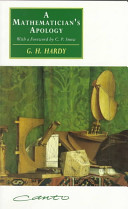Mathematics is More Popular Than Music and Art
Archimedes will be remembered when Aeschylus is forgotten, because languages die and mathematical ideas do not. 'Immortality' may be a silly word, but probably a mathematician has the best chance of whatever it may mean."
[* * *]
A mathematician, like a painter or a poet, is a maker of patterns. If his patterns are more permanent than theirs, it is because they are made with ideas.
[* * *]
The mathematician's patterns, like the painter's or the poet's, must be beautiful; the ideas, like the colours or the words, must fit together in a harmonious way. Beauty is the first test: there is no permanent place in the world for ugly mathematics. And here I must deal with a misconception which is still widespread (though probably much less so now than it was twenty years ago), what Whitehead has called the `literary superstition' that love of and aesthetic appreciation of mathematics is `a monomania confined to a few eccentrics in each generation'.
It would be difficult now to find an educated man quite insensitive to the aesthetic appeal of mathematics. It may be very hard to define mathematical beauty, but that is just as true of beauty of any kind - we may not know quite what we mean by a beautiful poem, but that does not prevent us from recognizing one when we read it. Even Professor Hogben, who is out to minimize at all costs the importance of the aesthetic element in mathematics, does not venture to deny its reality. `There are, to be sure, individuals for whom mathematics exercises a coldly impersonal attraction... The aesthetic appeal of mathematics maybe very real for a chosen few.' But they are `few', he suggests, and they feel `coldly' (and are really rather ridiculous people, who live in silly little university towns sheltered from the fresh breezes of the wide open spaces). In this he is merely echoing Whitehead's `literary superstition'.
The fact is that there are few more `popular' subjects than mathematics. Most people have some appreciation of mathematics, just as most people can enjoy a pleasant tune; and there are probably more people really interested in mathematics than in music. Appearances may suggest the contrary, but there are easy explanations. Music can be used to stimulate mass emotion, while mathematics cannot; and musical incapacity is recognized (no doubt rightly) as mildly discreditable, whereas most people are so frightened of the name of mathematics that they are ready, quite unaffectedly, to exaggerate their own mathematical stupidity.
A very little reflection is enough to expose the absurdity of the `literary superstition'. There are masses of chess-players in every civilized country - in Russia, almost the whole educated population; and every chess-player can recognize and appreciate a `beautiful' game or problem. Yet a chess problem is simply an exercise in pure mathematics (a game note entirely, since psychology also plays a part), and everyone who calls a problem `beautiful' is applauding mathematical beauty, even if it is beauty of a comparatively lowly kind. Chess problems are the hymn-tunes of mathematics.
We may learn the same lesson, at a lower level but for a wider publicm from bridge, or descending further, from the puzzle columns of the popular newspapers. Nearly all their immense popularity is a tribute to the drawing power of rudimentary mathematics, and the better makers of puzzles, such as `Dudeney' or `Caliban', use very little else. They know their business; what the public wants is a little intellectual `kick', and nothing else has quite the kick of mathematics.
Notes:
Mathematical ideas are more permanent in culture than artistic ones, and more people play in mathematical games without realizing it.
Folksonomies: mathematics art beauty
Taxonomies:
/science/mathematics (0.797017)
/art and entertainment/humor (0.310385)
/hobbies and interests/games/board games and puzzles (0.284501)
Keywords:
literary superstition (0.943107 (negative:-0.409341)), mathematics (0.929194 (positive:0.020754)), aesthetic appeal (0.818113 (positive:0.520606)), Art Mathematical ideas (0.818009 (neutral:0.000000)), silly little university (0.759163 (negative:-0.693017)), wide open spaces (0.747256 (positive:0.818796)), comparatively lowly kind (0.743420 (neutral:0.000000)), mathematical beauty (0.741552 (positive:0.475802)), little intellectual `kick', and (0.735995 (negative:-0.495800)), ugly mathematics (0.644755 (negative:-0.436218)), mathematical games (0.632068 (neutral:0.000000)), aesthetic appreciation (0.625869 (positive:0.525926)), rudimentary mathematics (0.625570 (negative:-0.415116)), harmonious way (0.624753 (positive:0.432699)), people (0.624223 (negative:-0.077692)), best chance (0.622050 (positive:0.664721)), Professor Hogben (0.621838 (neutral:0.000000)), artistic ones (0.613454 (neutral:0.000000)), beautiful poem (0.611929 (neutral:0.000000)), pure mathematics (0.609027 (negative:-0.363142)), mathematical stupidity (0.604725 (negative:-0.632403)), permanent place (0.601547 (negative:-0.436218)), fresh breezes (0.599704 (positive:0.818796)), musical incapacity (0.599061 (negative:-0.346826)), mathematics. Most people (0.594977 (neutral:0.000000)), immense popularity (0.593312 (positive:0.608670)), civilized country (0.592007 (positive:0.252585)), easy explanations (0.588567 (positive:0.371986)), popular newspapers (0.588071 (neutral:0.000000)), mass emotion (0.588047 (neutral:0.000000))
Entities:
Professor Hogben:Person (0.770573 (negative:-0.359525)), Whitehead:Person (0.660358 (negative:-0.327737)), Archimedes:Person (0.571015 (negative:-0.331995)), Aeschylus:Person (0.554546 (negative:-0.331995)), Russia:Country (0.451887 (neutral:0.000000)), twenty years:Quantity (0.451887 (neutral:0.000000))
Concepts:
Mathematics (0.972154): dbpedia | freebase | opencyc
Aesthetics (0.873868): dbpedia | freebase
Beauty (0.697425): dbpedia | freebase
Mathematical beauty (0.474945): dbpedia | freebase | yago
Science (0.463053): dbpedia | freebase | opencyc
Art (0.451010): dbpedia | freebase
Algebra (0.446618): dbpedia | freebase | opencyc
Renaissance (0.425550): dbpedia | freebase | opencyc





